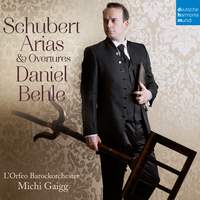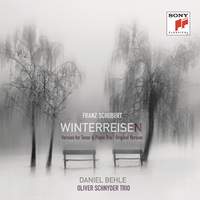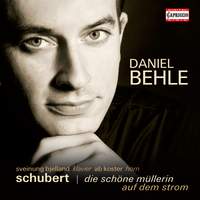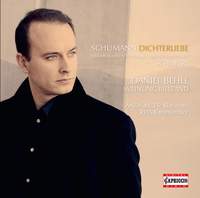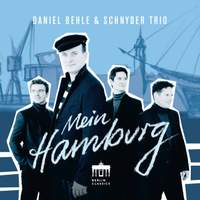Interview,
Daniel Behle on Schubert's unfinished operas
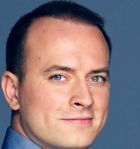 The German tenor Daniel Behle has a certain amount of form when it comes to recording Schubert with a twist - following his recent Winterreise on Sony (which coupled the original version for voice and piano with Behle's own arrangement of the piece for tenor and piano trio), his latest recording focuses on a side of the composer that remains largely unexplored - his (predominantly incomplete) works for the operatic stage, from the early singspiels Adrast and Claudine von Villa Bella to the heroic early Romanticism of Fierrabras and Alfonso und Estrella.
The German tenor Daniel Behle has a certain amount of form when it comes to recording Schubert with a twist - following his recent Winterreise on Sony (which coupled the original version for voice and piano with Behle's own arrangement of the piece for tenor and piano trio), his latest recording focuses on a side of the composer that remains largely unexplored - his (predominantly incomplete) works for the operatic stage, from the early singspiels Adrast and Claudine von Villa Bella to the heroic early Romanticism of Fierrabras and Alfonso und Estrella.
I spoke to Daniel about the disc on Monday as he took a break from rehearsals in Bayreuth, where he's about to make his Festival debut as David in Barrie Kosky's new production of Die Meistersinger von Nürnberg, followed by Froh in the revival of Frank Castorf's Ring Cycle…
Schubert’s music for the stage is so rarely performed and recorded – why do you think this is?
I think the main problem is that as he died at such a young age almost all of these operas were never completed – there are huge stretches of music that are missing altogether, and there’s still so much work to be done before they would be ready to stage. The second problem is that they’re really, really hard to do well! On first hearing they sound quite easy, but in a way there’s a lot of Donizetti in there – it’s very much a German composer trying to do Italian opera! You hear this most in the final track, the Zauberglöckchen aria ('Der Tag entflieht, der Abend glüht'), which I believe was a great favourite of Brahms; he liked this aria very much, but even so it’s never been recorded or staged until now.
Leaving aside the fact that the works themselves are incomplete, how ‘finished’ were the excerpts we hear on the recording? Did they even exist in published form when you started work on the album?
The Orfeo Barockorchester approached me about this project in 2013 via Christian Moritz-Bauer, the dramaturg who seeks out repertoire for the ensemble and also works together with the Schubert Association. There was a tremendous amount of research and editing to be done in order to make these arias performable – it was a case of going through all those handwritten manuscripts and making them playable for the orchestra.
We’ve kept it all as authentic as possible, using original orchestration and period instruments, and some of orchestral writing is pretty challenging, especially when it's done with baroque tuning and old woodwind. For example, there is some very high writing for the bassoons and some very low writing for the flutes which you can hear in the second track, the Zauberharfe aria ('Was belebt die schöne Welt?') – those opening chords were the most difficult bit of the programme to record because it’s so hard to get in tune!
Do you see much of Schubert the lieder-composer in these arias, or does he have a significantly different voice when writing for the theatre?
The thing with Schubert is that all the different genres he composed in are pretty different (compare his chamber-music and his songs), and in the operas perhaps there’s not so much ‘Schubert’ as such – at least that’s sometimes what people say if they’re used to listening to the songs, which are generally pretty dark and heavy to sing. And the opera is an entirely different thing: Schubert’s opera is completely 'under surveillance'!
But the most interesting thing to me is that link with the light Italian bel canto style, which he brings into this music and connects with not just the German language but also with the lines and phrases of song: it’s actually very song-like writing in places, but then it often changes suddenly and becomes very heroic. To do it right, you really have to bring a lot of vocal colours to the table, otherwise to be honest it can get pretty boring!
It seems to me that Schubert was very impressed by the Italians’ grasp of the economics of writing for the theatre, in terms of what has the most impact on the crowd. If you listen to the overtures of these operas there are quite slight musical ideas in the beginning and then a lot of cadenzas towards the end, and in a way this is rather like the Italians, particularly Rossini and Donizetti!
Can you trace a development in his style over the course of the music on this disc?
It’s important to remember that even with the later arias on the recording, we’re talking about a composer who was still very much in development – you never have to forget that he died at 31, eleven years younger than I am now! If he’d lived to be older, who knows? There would’ve been a lot of really great stuff, I think. So we have to share, in a way, all the parts of the operas that he did finish, as we've done with these ten arias on this disc, though of course it’s crucial to bear in mind that we’re taking them completely out of context - we have no way of knowing what his final thoughts on them would have been. But that said, I still feel it’s important to bring together what ‘finished’ music there is and present it to the public. Maybe some day a composer will come along and try to bring it all together – though in all honesty I don’t know if that's even necessary…It’s such attractive music, but perhaps we should leave it as it is!
Daniel Behle's collection of Schubert Overtures, Romances & Arias was released on 26th May on Deutsche Harmonia Mundi.
Available Formats: CD, MP3, FLAC, Hi-Res FLAC
Recent and related recordings from Daniel Behle
'In both versions, Behle’s musically scrupulous interpretation is appealing...Schnyder, meanwhile, provides controlled and sensitive accompaniments.' (BBC Music Magazine)
Available Formats: MP3, FLAC, Hi-Res FLAC
Schubert: Die Schöne Müllerin & Auf dem Strome
Daniel Behle (tenor), Sveinung Bjelland (piano), Ab Koster (horn)
'Behle has a beautiful, light lyrical tenor voice, suave in pianissimo, agile in faster passages and with surprisingly powerful fortes...He also has something to say about the songs, letting the words make impact through clear diction and unforced naturalness.' (MusicWeb International)
Available Formats: CD, MP3, FLAC
'Behle sings Dichterliebe without distortions or false exaggerations, and with a wonderfully precise feel for the highlights.' (NDR)
Available Formats: CD, MP3, FLAC
'Behle moves freely between genres and is equally successful in them all...All in all this is a wonderful disc that all admirers of Daniel Behle and of good singing on the whole should allow themselves to own.' (MusicWeb International)
Available Formats: CD, MP3, FLAC, Hi-Res FLAC


